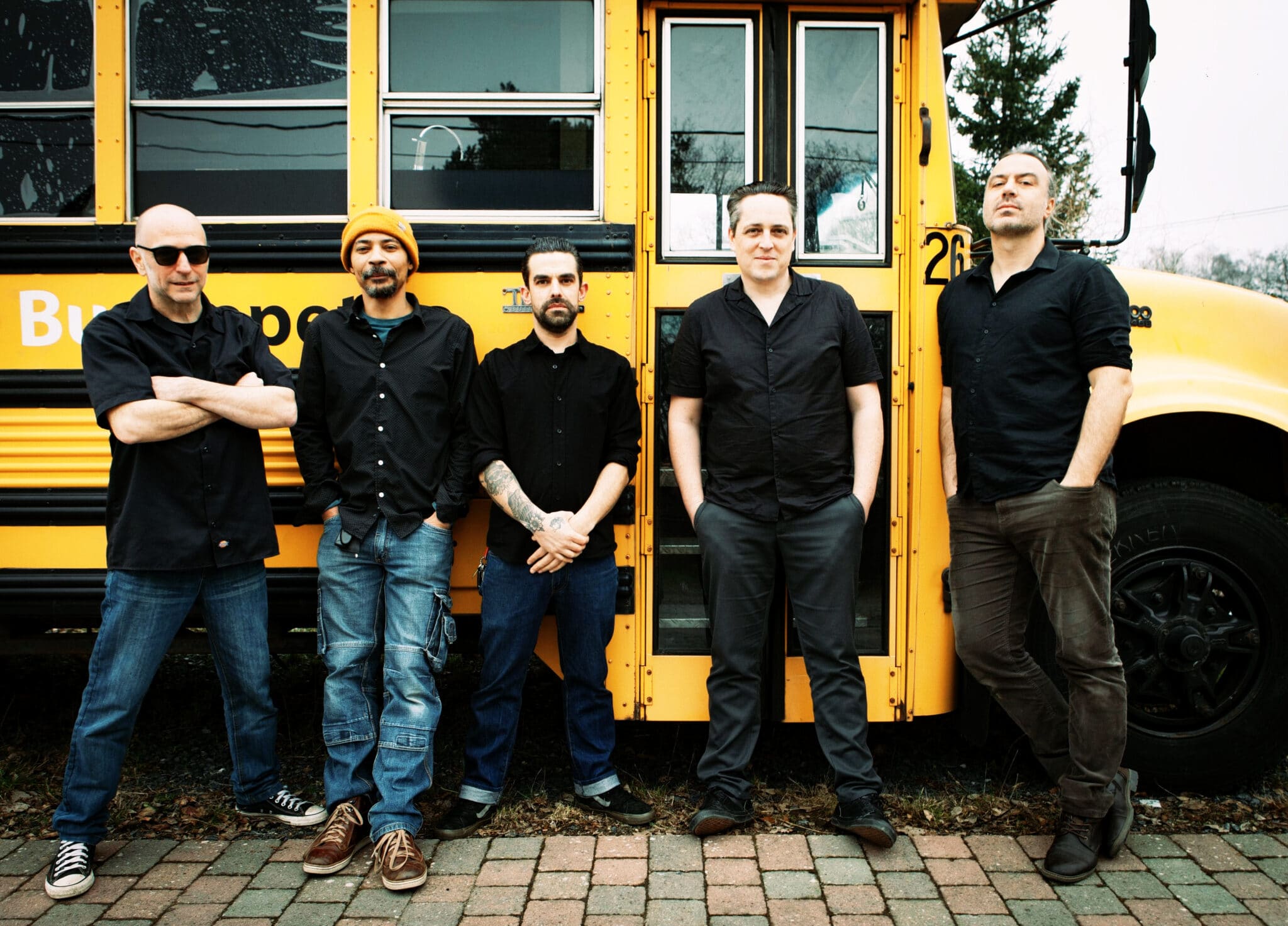A couple of weeks ago, Rootfire published an article about The Bandulus, who just released a royal flush of an album titled Tell it Like it Is on Badasonic Records. Well, the Belgian-based label has dropped aces back to back with their next release, this one titled Look Around You from a new group called The Utopians.
Look Around You offers nine high-energy tracks in an early reggae style that bring to mind a young Jimmy Cliff, or to cite an example from our modern era, The Aggrolites. In fact, Utopians drummer Nico Leonard, who also produced the record, has performed with Aggrolites on their European tour dates, so fans of that “dirty reggae” sound from California should dig this album.
Beyond Nico Leonard, who is a partner in the Badasonic Records label and produces a lot of their titles, who are The Utopians and from where did they emerge? To start, bass player Arnaud Pemmers played with Leonard previously in their ska/reggae band, Moon Invaders. The rest of The Utopians consist of lead vocalist and guitarist, Nicolas Nsakala, Yoann Grudzien on keyboards and backing vocals and Romain Trigaux on guitar and backing vocals. The bandmembers call home in the Province of Luxembourg, in the Ardennes, and in Charleroi, Belgium, where the album was recorded at Badasonic Studios.
Over the past 20 years, the musicians of The Utopians have played in several bands across different styles, including pop, rock, jazz, roots and rockabilly. Then, during the pandemic lockdown, Arnaud had the urge to get back to playing reggae in a similar style to Moon Invaders, so, according to Nsakala, he started “remixing sounds using the drums recorded by Nico for Moon.” He then asked Trigaux, who played with him in two different roots/rockabilly bands, to write lyrics and guitar to accompany his ideas. This collaboration resulted in “On the Road” and “Hit and Run,” two tracks from The Utopians’ debut EP, How the World Turns, which perfectly set the tone for the record they would soon be releasing.
Nsakala recounted, “The idea of a group gradually imposed itself on Arnaud, who searched in his oldies knowing a singer (myself), a drummer (Nico was logical) and a keyboardist, Yo. The project was launched, all that remained was to put everything in place. Thanks to the experience and contact of Nico Leonard, the project very quickly took off.”
Nsakala credits Leonard with recruiting label mates, The Bandulus, to sing backup vocals on the record, giving it a fuller, soul-tinged sound. “Another good idea from Badasonic, building bridges between continents,” said Nsakala. “This group is awesome. We love their style.”
Nsakala said that he along with Yoann Grudzien and Romain Trigaux recorded their own backing vocals in his studio in Jamoigne as a guide to demonstrate what he was looking for, before passing them on to Leonard who forwarded them on to The Bandulus to re-record in the States. There, the Portland, Oregon-based group followed Nsakala’s cue while adding their own ideas. “I must say that we had some very nice surprises while listening,” Nsakala shared, “A cherry on the cake. We love the result.”
In addition to crediting Leonard for cementing the foundation of the band as well as bringing in The Bandulus, Nsakala said that it was a “real pleasure” to work with him in the studio. “He knows exactly where he wants to go and it allowed us to focus on the arrangements and the color we wanted for the project. For my part, I finally had the opportunity to express myself and write texts that were close to my heart.”
Right off the bat, listeners get a glimpse into Nsakala’s consciousness as it spills into the lyrics of Look Around You’s first song, which shares the same name as the band. Nsakala sings:
I dream of a world where we are all equal
A world where every life is pure and wild
An air that smells of green and flourishing nature
Translucent water teeming with life
“The idea of the piece is to say that we want a better world, more egalitarian, less devious,” Nsakala shared with me. “I do not understand the purpose of today’s world, which considers humans as a resource in the same way as gold or oil.”
He continued, “For this to change, we need a personal revolution; in my opinion, it is up to each person to make their internal ‘revolution’ before thinking about making it a common one.”
While the song’s lyrics paint a picture of Nsakala’s conception of paradise, at the same time, Nsakala acknowledges concern for the future with the paradox of AI looming:
That technology helps humanity, but does not take its place in infinity…
“We are reaching a point where technology is no longer a tool, despite what we are led to believe, but risks replacing humans,” said Nsakala. “I don’t see the point of having an AI that paints, draws, and writes music for me. This is precisely what makes us human. So, I hope that humanity will always have its place in infinity.”
The Utopians keep the good feelings flowing into the next track, “Perfect Kind,” a glorious tune with a Wonderful World, Beautiful People feel. It celebrates reggae music with lines like “A holy bass to guide your soul” and features the chorus:
A Perfect kind of happiness
It makes you swing like a cosmic wave
It makes you feel you’re light as a breath
It makes you dance all night with friends
Nsakala’s lyrics turn towards romantic woes in the next track, “I Was Wrong,” which, despite its theme of heartbreak, has one of the most joyful and catchy melodies on the album. The song is sweetened by The Bandulus backup vocals and the lovely singing of the band’s Leah Farmer, who takes the second verse for herself.
Utopians slow the pace down a bit with the next track, “How the World Turns.” Accompanying the more traditional roots reggae beat, Nsakala’s lyrics shift from idealistic and celebratory to weighty as he comments on the racial inequality that he has experienced throughout his life.
Baby your life is already mapped out
You’ve been classified by your race…
and
You grow up dreaming of freedom
Rage in the belly but the cage has closed already…
and
Fear is a good weapon to herd the sheep
A recipe that has proven itself for so many years
“I have parents of different origins. I am mixed race. My father is Congolese and my mother is Belgian,” Nsakala shared. “It has never been easy to find your place when you are mixed race, and it still is not. Another aberration of this world, people have children for love and then find themselves rejected by their own community which does not respect itself. Well, so be it… It wasn’t easy for us as mixed-race people. I won’t go into details, but humans can be cruel and stupid.”
Despite calling out the dark reality of the shitstem (as Peter Tosh would term it) throughout the song, perhaps as a reflection of his resolve and optimistic nature, Nsakala nevertheless includes nuggets of good vibes with the final lines of the song, “Divide and conquer is their nature, Loving your brothers and sisters your weapon against the oppressor” and the lyrics in the chorus, “Spread your love all over the place.”
Next, “Homeless” maintains the subdued vibe with a melancholic early reggae song about, as the title clearly states, the struggles of homelessness.
Utopians pivot back to revelry with the following song, “Funky Monkey,” which features some great keyboard jamming sure to get people swaying their hips.
After that playful romp, the band reverts back to the slower tempo of roots reggae with another autobiographical song, “Leaving Africa,” where Nsakala recounts a troubling turning point in his life.
“I was born in Belgium but I lived my entire childhood, from one to 15, in Kinshasa, the capital of Zaire (at the time), a former Belgian colony,” Nsakala said. “My mother worked for Belgian cooperation in the Congo as a teacher. My father was not around much. We had a heavenly childhood, sun, friends, family, and unlimited fruit – that’s what I loved the most.”
Continuing, he said, “In 1989, at the age of 15, overnight, Belgium and the Zairian president at the time, Mobutu, quarreled and Belgium decided to cut all aid to the cooperation. My mother lost her job. My father, who did nothing, was busy with these other ‘offices’ as they say in Africa. We usually came back every year for the holidays to see family in Belgium. This year, we came for the holidays but we never went home. I lost the link with a whole part of my family in Africa and we had to start a new life in Belgium. We were not the only family to have to return, but it was very different when the father was white and the mother black. My mother never found a suitable job, even though she was a priority, and she had to cope with four children by giving private lessons. I can never thank her enough for her sacrifice.”
Nsakala added that he visited his “African family” again in 2017 during a return trip with his son, when he saw his father again, and that he keeps in touch with his nieces and nephews through the internet, but that he hasn’t been able to reconnect with any of his childhood friends.
Keeping the listening experience diverse, from this sad tale Utopians kick it back into high gear with the energetic “Don’t Work,” another mirthful track that gloriously channels The Aggrolites. The song laments the grind of the rat race while Nsakala urges listeners not to sell their souls for money, concluding with the thought-provoking sentiments:
Don’t you think that your kids need more love than money?
Don’t you know that you can’t swap wasted time for money?
The ninth song, “Lightning Love,” is a ska song that, despite its good feels, speaks of heartbreak.
Finally, the album concludes on an upbeat note with “On the Road,” an early reggae burner that celebrates the touring lifestyle of a band.
It’s worth noting that the album cover features the artwork of French artist, Raf Urban, who’s unique and striking style draws inspiration from urban culture and the graffiti movement. According to Nsakala, their keyboard player, Yoann Grudzien, had been familiar with the artist and showed the band some examples of Urban’s work. They were instantly “hooked” and selected the design for the cover because they felt it corresponded to the album’s themes of diversity, hope, and tolerance.
In sum, Look Around You stands out as one of the most exciting releases in modern reggae so far this year. Perhaps if the music resonates with enough of us listeners here in the U.S., the band will make the trip across the pond to play some shows for us in the future.
